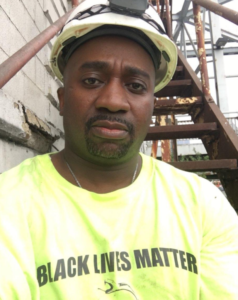 Carlos Toliver was incarcerated at age 16 and earned his GED behind bars in 1998. He had already served 20 years in prison before he first started taking college classes. Now he is out of prison and working for a construction and demolition firm in Buffalo, N.Y. We caught up to him to ask him how CPEP effected his life in the past and how it continues to have an impact on him.
Carlos Toliver was incarcerated at age 16 and earned his GED behind bars in 1998. He had already served 20 years in prison before he first started taking college classes. Now he is out of prison and working for a construction and demolition firm in Buffalo, N.Y. We caught up to him to ask him how CPEP effected his life in the past and how it continues to have an impact on him.
Mr. Toliver spoke with CPEP’s Emily Hopkins. This interview has been edited slightly for length and clarity.
Q. How did you get involved with Cornell’s Prison Education Program?
I was actually at the Wyoming Correctional Facility, where they had a consortium of small colleges coming in to help guys out. It offered a bachelor’s degree in social sciences. I got into that program and when I was two and half semesters in, the director of the program ended up retiring after 27 years. He was trying to pass on the program to someone else. He went out every year looking for money for the program. He was an excellent guy. Well, he called around the state and ended up talking to Rob Scott at Cornell, asking to let some of his guys into his program.
I was happy Rob Scott accepted us—there were six or seven of us. We got a school transfer to Cayuga Correctional Facility. It was a little tough [to transfer to a new place] at first because when you’re doing those college classes, you develop a support group—classmates and professors you can bounce stuff off of. I had to double learn stuff, especially math and biology. Some of that stuff you already had to know, so I’m learning elementary college stuff while in advanced classes. But I had a ball and learned so much.
Q. Is there one CPEP class that you feel keeps serving you today, one that you think about most?
My favorite is all the English classes. Ms. Violette and Professor Dani, a Jewish Italian lady from Italy, who was one of my favorite teachers of all time. I also took Public Policy with Jamila Michener, who was down to earth. It was one of those classes you didn’t know anything about when you saw it on the list. That class really opened eyes to politics and everyday living.
But my favorite classes, the ones that really contribute to my success today, are the English classes. They taught me to organize my thinking and opinions in a structured way. There are lot of the techniques I learned back in those classes that I still use today. I’m always thinking in essay form. Don’t forget your points, I remind myself. I loved reading the books, debating, writing the essays. I liked writing so much that I’d write two essays on two totally different topics and then pick the one that I thought communicated the best.
Q. Are you done with school?
I got the associates degree through CPEP. And I still take some of the classes by zoom. I’m in Bruce Levitt’s theater class this semester. It just started. Next week will be our third class.
Q. What’s next for you?
I got married six months ago. I’m just living. My reason for enjoying the Cornell English classes is that I like to write. That’s what I do. I just do the construction and demolition to make a living, but I’m a writer. I spend most of my time when I’m not at work reading and jotting things down. That’s exciting, getting them [things I wrote on paper while in prison] onto the laptop.
Q. What are you reading now?
I’m reading one of my favorite authors of all time. James Baldwin. Native Son. It’s a book of essays. I actually got this book when I was incarcerated. The essays are so beautiful.
Q. You mentioned that before becoming more educated, communication was a problem for you. Do you think lack of education in communication leads to violence?
It did and it do, yes. I had a problem with communication growing up as a kid. That was one of my issues. An author, I forget her name, said that the limitation on your communication is the limitation of your world. That stuck with me. Everything stops with you if you can’t communicate. You might have an issue with someone and it’s not really a big issue but a bunch of small stuff that comes up. And you don’t know how to communicate it to them without being sarcastic or offensive. What I used to do when I had issues or needed something was I just kept it to myself. You walk around the Earth and every time something bumps into you, you continue to get bruised by people in the world. Eventually you get fed up and lash out. It’s not their fault, but you didn’t communicate that you didn’t like the way they treated you or what you need, your likes and dislikes. Being able to communicate is priceless.
